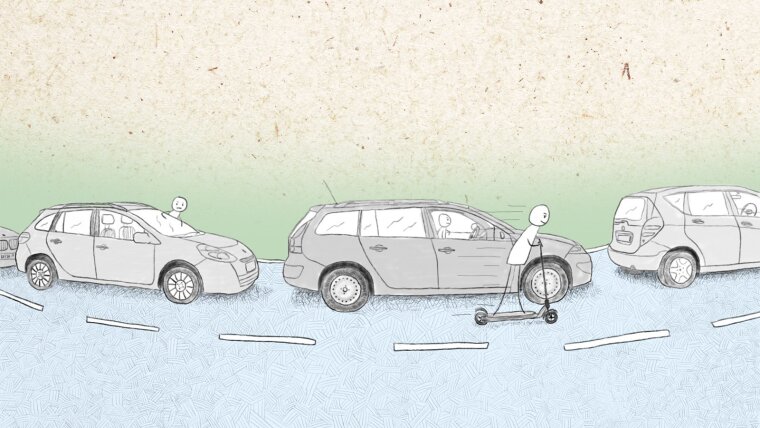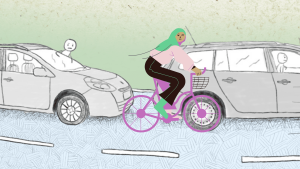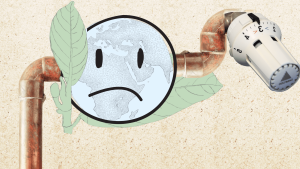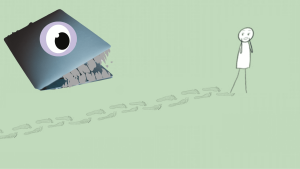
The enormous emissions of greenhouse gases such as CO₂ are severe drivers of the climate crisis. By burning fossil fuels such as coal, oil and natural gas our emissions from today are heating up the planet for decades to come.
Whether in the use of public infrastructure or in private consumption - there is hardly any aspect of life in our industrialized societies that does not have a carbon footprint. It is up to us to develop a sustainable way of life in order to achieve well-being without destroying the environment.
This is how you can make a difference:
-
Choice of the vehicle
A person rides a bicycle past the traffic jam
Collage: Julian Ukena, skechify via canva.com, Tabea SeeßelbergOn the road by bike
A characteristic route to university and back (from a student residential home in Lobeda to Carl-Zeiß-Str. 3) is about 14 kilometres. A person who travels this distance three times a week covers about 1,600 kilometres per year. Depending on the vehicle, this causes significant emissions. Compared to travelling by car, in the above example cycling saves more than 200 kg of CO2 per year, and taking the bus saves about 150 kg of CO2 per year.
Here is what you can do:
- Cycling causes zero emissions, keeps you healthy and is a fast way to get around.
- You can find tools to repair your bike at public repair stations at Löbdergraben in front of Neue Mitte or Ernst-Abbe-Platz. The ADFC Jena-SaaletalExternal link (available in German only) regularly offers self-help repair workshops.
- To facilitate cycling and make it safer, you can sign a petition and get involved in the initiative Radentscheid JenaExternal link.
Traveling by train
With the thoska you can get all around Thuringia without a car. All means of regional public transport are included in your semester ticket.
- You can use all regional trains in Thuringia with your semester ticket at no additional costs and even take your bike on the train.
- For longer trips it is worth booking cheap train tickets online months in advance or using ride sharing services.
-
Power consumption at the university
A heater with a sad face
Collage: Julian Ukena, Tabea Seeßelberg, via canva.com: tanarchPower consumption at the university
The University of Jena produces more than 5,000 tons of CO₂ per year (as of 2017-2019). Three quarters of these greenhouse gases are caused for heating purposes. The same applies to your own apartment or house.
Since 2014, the University of Jena has been powered entirely by green electricity. But even green energy uses up resources and should not be wasted. In total, the entire university has an annual electricity consumption of over 27 gigawatt hours, at a cost of 5.6 million euros (as of 2019).
On average, a university member consumes 1,250 Kwh per year. This is about as much electricity as used by a thrifty single household (1,300 Kwh).
How does the university provide heating?
The University of Jena obtains a large part of its heating energy from the district heating network, which is currently fed by natural gas. A few remote properties are heated through decentralized oil, gas and liquid gas (causing about 5% of the emissions of our university). In many facilities the heating is centrally controlled by the housekeeping service. In seminar rooms or offices you can partly influence the room temperature and help to save energy. The optimal room temperature ranges between 19 and 20 degrees Celsius.
How to save energy in daily life at university
- Whether in a lecture hall, seminar room, laboratory or in the office: When the radiator is running, keep windows and doors shut. Shock ventilation provides you with fresh air without getting cold.
- If available, turn the heating down a degree or two and wear warm clothes. Every additional degree of room temperature consumes extra energy and causes emissions.
- Turn off devices that will not be used for a while: Screens, computers, etc.
- Avoid stand-by mode for all devices.
- Unplug unused appliances or use power sockets with a switch.
- Find more detailed tips on how to save energy on our website
Further Information
- Verbraucherzentrale Nordrhein-Westfahlen has summarized tips for saving energy at home from the use of lighting to washing machines in this comprehensive guideExternal link.
- All numbers on energy usage and emissions of the University of Jena can be found in the report on energy consumptionpdf, 3 mb · de (available in German only)
-
Using the Internet
A hungry notebook chases a human
Collage: Julian Ukena, Tabea Seeßelberg, via canva.com: dhtgip, PravokrugulnikThe Internet is a power guzzler
We read the latest news in our news feed during breakfast, watch YouTube videos in the break, and stream that new show everyone's talking about in the evening. This data traffic eats up a huge amount of energy.
Every year, around 500 terawatt hours are needed worldwide to keep servers permanently running that aree required for services such as e-mail, streaming and clouds. That's about the equivalent of Germany's total electricity consumption within one year!
Each search request and every social media post requires the use of electricity. Even the seemingly gratuitous use of digital media thus has an enormous impact on our environment.
Save the climate with these hacks
- Save your favorite playlist locally if available. Same for the educational video that you watch repeatedly.
- Bookmark frequently visited websites in your browser. Every search query consumes power! This way you can browse more energy-efficiently and faster.
- Reduce resolution and data transfer on your devides - for example, when you watch videos on your smartphone or play music videos only for the sake of the songs.
- Autoplay becomes an unnecessary power hog when you fall asleep listening to your favorite YouTuber. Deactivate Autoplay, if possible.
- Regularly delete unnecessary e-mails from your inbox, empty the spam-folder and unsubscribe from newsletters and notification e-mails e.g. from social media. This way you reduce server space and unnecessary data traffic.
- Voice assistants consume more energy than typing via keyboard.
- Turn off your phone during the night. Most devices offer an alarm function when the phone is switched off. This will extend the lifetime of your phone.


